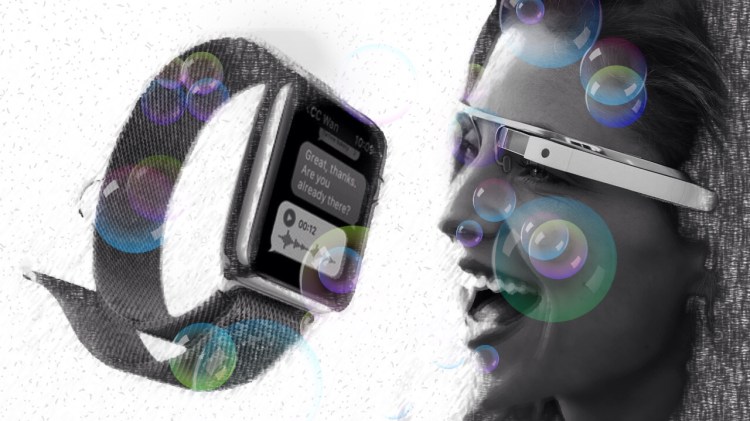In one of the stranger marketing gambits in the history of marketing gambits, Apple and Google seem to agree on why you need to buy wearables.
Their argument is this: Smartphones are destroying us. Only wearables can save us from the antisocial tyranny inflicted by these unholy gadgets.
It’s bizarre, of course, because perhaps no two companies have done more to enable the sales of millions and millions of smartphones than Apple, thanks to the iPhone, and Google, thanks to the Android operating system. Apple and Google saving us from smartphones by selling us wearable computing salvation is a little like your heroin dealer approaching you after an overdose and offering you a deal on some methadone.
And yet, there it is.
I first heard this argument trotted out two years ago when attending TED. Google cofounder Sergey Brin walked out on stage and showed a promotional video for Google Glass. When it ended, he stood hunched over his smartphone for a few seconds, made a bad joke about a Nigerian prince, and then explained how that pose was the real inspiration for Google Glass.
“This position that you just saw me in, looking down at my phone, that’s one of the reasons behind this project, Project Glass,” he said. “Because we ultimately questioned whether this is the ultimate future of how you want to connect to other people in your life, how you want to connect to information. Should it be by just walking around looking down?”
In effect, Brin said, smartphones are for antisocial losers who want to look like asses all day.
“In addition to potentially socially isolating yourself when you’re out and about looking at your phone, it’s kind of, is this what you’re meant to do with your body? You’re standing around there and you’re just rubbing this featureless piece of glass,” Brin mused.
Worse, these smartphones turn you into addicts.
“The cell phone is — yeah, you have to look down on it and all that, but it’s also kind of a nervous habit,” Brin said. “Like if I smoked, I’d probably just smoke instead. I would just light up a cigarette. It would look cooler. … It really opened my eyes to how much of my life I spent just secluding away, be it email or social posts or whatnot, even though it wasn’t really — there’s nothing really that important or that pressing. And with this, I know I will get certain messages if I really need them, but I don’t have to be checking them all the time.”
Ring a bell? If you read the recent Wired exclusive about the secret history of the Apple Watch, then it might sound like you’re in an echo chamber. After first deciding to make a watch, Apple apparently then set out to figure out why you would need one.
The answer, according to Wired: “Your phone is ruining your life. Like the rest of us … everyone at Apple are subject to the tyranny of the buzz — the constant checking, the long list of nagging notifications.
“We’re so connected, kind of ever-presently, with technology now,” Kevin Lynch, Apple’s vice president of technology, said in the interview. “People are carrying their phones with them and looking at the screen so much.”
Lynch added: “People want that level of engagement. But how do we provide it in a way that’s a little more human, a little more in the moment when you’re with somebody?”
Why, with an Apple Watch, of course!
Whether this argument will work any better for the Apple Watch than it did for Google Glass, well, who knows? The average person probably isn’t really tuned into these kind of stories. And Apple isn’t likely to start running ads that say, “Hey, the iPhone has made you an asshole, but we’ve got a new product to save you!”
Still, if the only way to sell wearables is to position them as solutions to the problem you created, and to label your own products as the source of human misery, then it makes me think both companies are straining to justify a new computing form factor that most of the world doesn’t need or want.
VentureBeat's mission is to be a digital town square for technical decision-makers to gain knowledge about transformative enterprise technology and transact. Learn More

